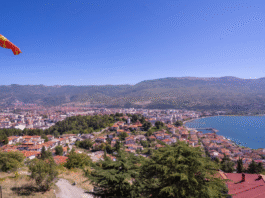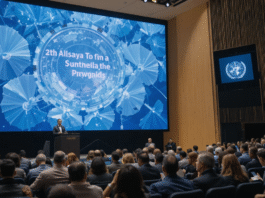Overview of the General Assembly’s Vote
Recently, the United Nations General Assembly conducted a significant vote that allowed representatives from Palestine to participate virtually in the 80th session. The resolution, which aimed to enhance the agency and voice of Palestine within the UN framework, garnered notable attention from various member states, reflecting the ongoing complexities surrounding Palestine’s international standing.
The recorded vote exhibited a remarkable level of support, with an overwhelming majority of member nations endorsing the resolution. Specifically, 131 countries voted in favor of allowing virtual participation, underlining the growing tendency amongst UN members to champion Palestinian representation. Conversely, only 10 countries opposed the resolution, highlighting a minor faction that remains steadfast in their opposition to broader Palestinian engagement within the United Nations. Additionally, 47 states opted to abstain from the vote, illustrating a significant degree of ambivalence and illustrating the delicate balance many nations strive to maintain concerning the contentious issue.
This decision holds considerable significance in the context of Palestine’s representation at the UN. By permitting virtual participation, the General Assembly acknowledges the ongoing need for inclusive dialogue on matters pertaining to Palestine. The vote serves as a demonstration of support from the international community towards Palestinian rights and aspirations, particularly in a time when geopolitical tensions frequently impede direct participation in global forums. Reaction from various member nations has been mixed; some countries applauded the decision as a step in the right direction, while others voiced concerns about the potential implications for regional stability. Ultimately, this pivotal vote underscores the complexity of Palestinian representation on the international stage and its broader implications for global diplomacy.
Background on Visa Denial and Diplomatic Implications
The recent visa denial faced by Palestinian officials seeking to participate in the United Nations General Assembly has ignited a significant discourse in the realm of international relations. Under the UN Headquarters Agreement, the host country, which is the United States in this case, has specific obligations to facilitate the entry of diplomats from member states. This agreement not only aims to promote diplomatic engagement but also ensures that all member states have an equal opportunity to participate in discussions that affect global governance.
The refusal to grant visas to Palestinian representatives raises critical questions regarding the host country’s commitment to its international responsibilities. This unprecedented action may signal a shift in diplomatic norms, particularly as it draws mixed reactions from various countries. Some nations have openly condemned the denial, emphasizing that it undermines the principles of inclusivity and equal representation within the UN framework. On the other hand, a different segment of the international community appears to support the decision, reflecting the complex geopolitical landscape in which these discussions take place.
Moreover, the implications of this denial extend beyond immediate diplomatic relations. The potential long-term effects on peace processes, especially in the context of the Israeli-Palestinian conflict, cannot be overlooked. The absence of Palestinian voices in crucial discussions at the UN could lead to a widening gap in understanding and negotiating peace initiatives. By isolating Palestinian officials from these platforms, there remains an ongoing risk that their perspectives and needs may be ignored in future policy-making endeavors.
As the global community observes these developments, the ramifications of the visa denial will likely influence diplomatic engagements, as nations reassess their strategies regarding participation in international organizations and discussions surrounding peace and conflict resolution.
U.S. Position and Critique of Palestinian Authority Actions
The United States government has consistently expressed its skepticism regarding Palestine’s political maneuvers, especially concerning its virtual participation in the United Nations General Assembly. The U.S. took a negative stance during the recent vote related to this issue, citing fundamental concerns about the actions and commitments of the Palestinian Authority (PA) and the Palestinian Liberation Organization (PLO). Central to the American critique is the assertion that both entities have not adhered to their obligations under previous agreements, notably the Oslo Accords.
U.S. representatives have highlighted that the Palestinian leadership’s failure to uphold these agreements undermines the prospect of achieving a stable and lasting peace with Israel. In particular, the continuation of funding for perceived terrorist activities has been a focal point of U.S. criticism. Officials argue that such funding not only contravenes international commitments but also seriously jeopardizes the security situation in the region, complicating efforts for constructive dialogue between the two parties.
Moreover, the U.S. has stressed that the Palestinian Authority’s approach tends to prioritize political maneuvering over genuine negotiations aimed at peace. This has raised concerns about whether the leadership is genuinely committed to a peaceful resolution or if they are focusing on international platforms to garner support without addressing the core issues at hand. The idea is that by engaging in actions that appear to seek legitimacy, the PA and PLO may further alienate their counterparts in Israel, thereby diminishing the chances of future reconciliation.
The implications of these U.S. perspectives are profound, as they not only influence the American diplomatic posture but also shape the international community’s response to Palestinian efforts for recognition and participation in global forums. The overarching sentiment is that sustainable peace can only be achieved through adherence to previous agreements and a commitment to countering terrorism effectively.
Reactions from Other Nations and Future Perspectives
The recent decision by the UN General Assembly allowing Palestine to participate virtually has elicited varied reactions from different countries. Prominent among these are the responses from nations such as Russia, China, and Iran. Each of these countries has expressed a strong alignment with Palestine’s right to engage in international discourse, viewing the U.S. visa denial to Palestinian representatives as detrimental to diplomatic inclusivity. Russia has underscored the significance of Palestine’s involvement in the United Nations, emphasizing that it enables broader representation of global perspectives, particularly regarding Middle Eastern affairs. Furthermore, Russia’s call for an enhanced role for Palestine within the UN framework reflects its commitment to supporting self-determination and statehood for Palestinians.
Similarly, China has articulated its deep concern over the implications of the U.S. decision to deny visas to Palestinian delegates. Chinese officials have asserted that such actions are counterproductive to peace efforts in the region, highlighting that inclusive dialogue is paramount for achieving lasting resolutions. China’s foreign ministry reiterated a commitment to supporting Palestinian statehood, framing its stance as foundational to global peace initiatives and cooperative international relations.
Iran has also voiced its support for Palestine, characterizing the United States’ visa policy as an affront to fairness in international politics. Iranian leaders have called for stronger global opposition to perceived injustices, advocating for solidarity among nations in enhancing the political presence of Palestine at international forums. As the global community reflects on these developments, future implications for Palestinian representation at the UN become increasingly significant. Upcoming conferences and discussions will likely serve as critical platforms for reaffirming Palestine’s status in international diplomacy. The virtual participation in the General Assembly may pave the way for broader dialogue, potentially influencing future diplomatic endeavors aimed at achieving a peaceful resolution in the Middle East.





Greetings! I’ve been reading your weblog for some time now and finally got the courage to go ahead and give you a shout out from Austin Texas! Just wanted to say keep up the great work!
What i don’t realize is in reality how you’re not actually much more neatly-preferred than you may be now. You are so intelligent. You already know therefore considerably in the case of this topic, made me for my part imagine it from a lot of varied angles. Its like men and women are not interested until it is one thing to accomplish with Woman gaga! Your own stuffs excellent. At all times care for it up!
What¦s Taking place i am new to this, I stumbled upon this I’ve discovered It absolutely helpful and it has aided me out loads. I’m hoping to give a contribution & help other users like its helped me. Good job.